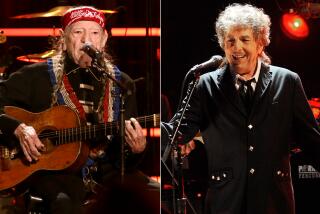Basin Street Comes to the Bowl
- Share via
The heady fragrance of gumbo would have made for a more atmospheric setting Friday night at the Hollywood Bowl, but failing that, Pete Fountain and Dr. John did the best they could to bring the ambience of the Crescent City to “Hot Nights in New Orleans.”
Fountain is a New Orleans perennial, of course, inextricably linked to the popular image of Dixieland music since he broke into the national consciousness in the ‘50s as a regular on Lawrence Welk’s television show.
Like the late Al Hirt, he has often been viewed skeptically within the serious jazz community--unfairly, given the skills of both players.
There wasn’t much doubt about what would be heard in Fountain’s program. Tunes such as “Basin Street Blues” and “Do You Know What It Means to Miss New Orleans?” have been staples of his repertoire for nearly half a century.
And it is to his credit that he still invested each number with enthusiasm, energy and an appealing sense of invention even though he must have played those tunes literally thousands of times.
It took a few minutes for him to get up to speed, however, and the opening number, “Clarinet Marmalade,” came close to becoming a train wreck as Fountain, his New Orleans Jazz Band and the Los Angeles Philharmonic (conducted by Larry Curtis) struggled to agree upon a common approach to the rhythm.
Matters improved dramatically once the various elements found a sync point, and Fountain concluded his pleasantly agreeable set with an intriguing medley of standards that offered a kind of audience name-that-tune climax.
Dr. John’s performance was a bit more enigmatic. The wild and crazy Dr. John of the late ‘60s, fondly recalled as the Night Tripper, was nowhere in evidence during a set that was largely dominated, strangely, by standards such as “Blue Skies,” “Candy” and a set of Duke Ellington tunes from the latest Dr. John recording, “Duke Elegant.”
The result was a surprisingly bland presentation, in which Dr. John’s sinewy, blues-drenched phrasing seemed to have difficulty surfacing through the combined forces of his quartet and the Los Angeles Philharmonic.
The tunes in which he performed solely with his group--featuring the ‘70s-style rock guitar of Renard Poce were the only efforts in which the roiling swing so characteristic of Dr. John’s earlier work took charge.
And it was those moments, combined with Fountain’s spirited clarinet work in the opening segment, that spiced and seasoned the evening with the taste of New Orleans’ inimitable and colorful sounds.
More to Read
The biggest entertainment stories
Get our big stories about Hollywood, film, television, music, arts, culture and more right in your inbox as soon as they publish.
You may occasionally receive promotional content from the Los Angeles Times.










